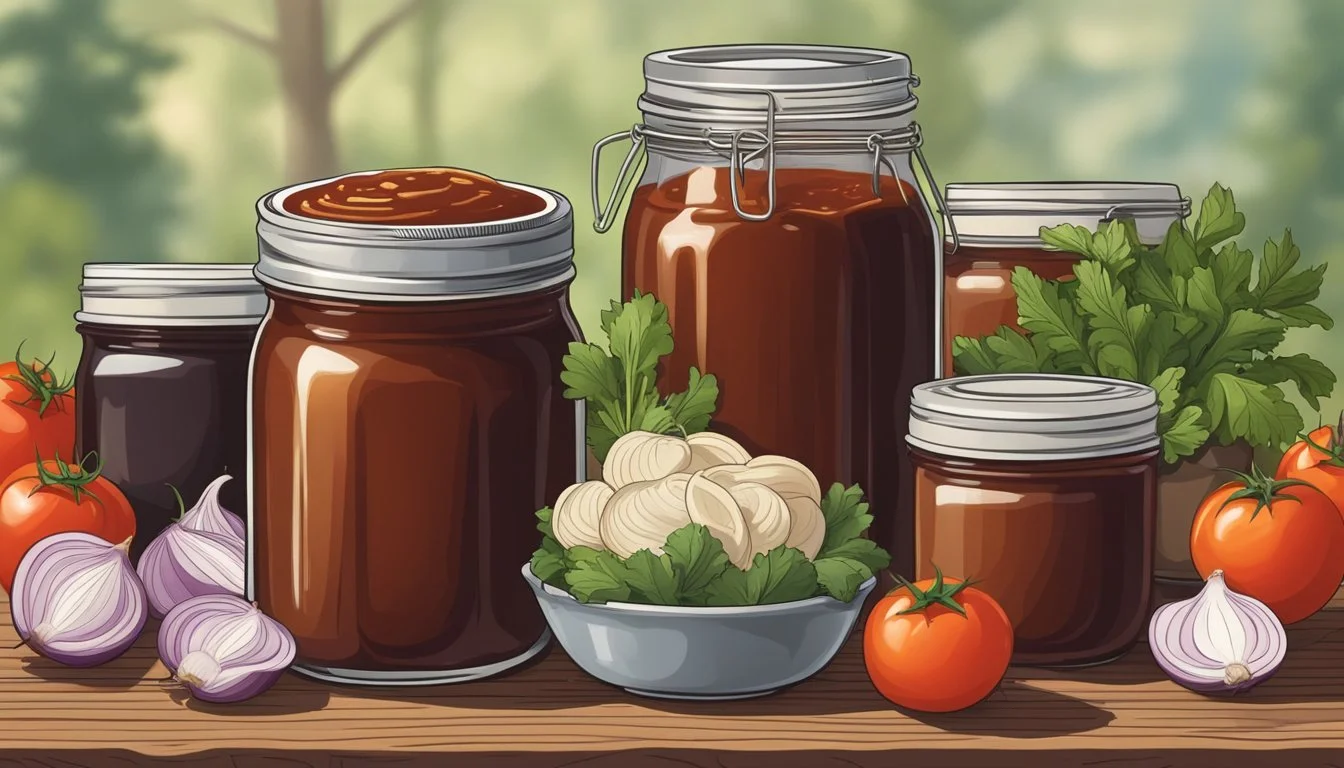Barbecue Sauce Substitutes
Top Alternatives for Your Grilling Needs
Barbecue (What wine goes well with barbecue?) sauce is a staple in many kitchens, known for its rich, smoky flavor that complements a variety of meats and dishes. However, there are occasions when a suitable substitute is needed, whether due to dietary restrictions, unavailable ingredients, or simply a desire to experiment with new flavors. A range of alternatives can offer similar depth and tanginess to dishes, ensuring that the absence of traditional barbecue sauce doesn't leave food tasting bland.
When looking for a barbecue sauce replacement, several options stand out for their ability to mimic or enhance the original sauce's taste profile. Teriyaki sauce can provide a similar sweetness with a touch of umami, making it an excellent 1:1 substitute in most recipes. For those preferring a tomato base, ketchup can be modified with spices to closely resemble barbecue sauce’s familiar zest. More adventurous cooks might also consider hoisin sauce or a spicy chili-garlic sauce to bring a unique twist to their dishes, all while maintaining that sought-after complexity that barbecue sauce is known for.
Understanding Barbecue Sauce
Barbecue sauce is a quintessential condiment in many cuisines, particularly in American barbecue traditions. Its complex flavor profile and versatility make it a staple at many cookouts and in various recipes.
Defining BBQ Sauce
Barbecue sauce, or BBQ sauce, is a seasoning sauce used as a marinade, a basting sauce, or a topping for grilled meat, including pork, beef, chicken, and ribs. It is known for its unique balance of sweetness, smokiness, and tanginess. This condiment enhances the flavor of the meat, contributing a signature taste that is often associated with traditional barbecues.
Barbecue Sauce Ingredients
The classic ingredients of barbecue sauce include:
Tomato base: Typically made from ketchup or tomato paste, providing the sauce its foundational substance and tang.
Vinegar: Adds sharpness and helps balance the sauce's sweetness.
Sugar: Often in the form of molasses, brown sugar, or honey, it contributes to the sauce's sweetness and helps in caramelization.
Spices: A range of spices can be included; common ones are garlic, onion powder, and mustard.
Liquid smoke: Imparts a smoky flavor to mimic the taste of meat cooked over a wood fire.
Types of Barbecue Sauce
There are various regional variations of barbecue sauce, which include:
Tomato-based sauce: Predominant in the Midwest and South, often sweetened with sugars and made smokier with liquid smoke.
Vinegar-based sauce: Common in North Carolina, it is thinner and tangier, highlighting vinegar's sharpness.
Mustard sauce: Popular in South Carolina, it features mustard for a tart and tangy flavor profile.
Other varieties: Include unique twists like mayonnaise-based Alabama white sauce, or those that incorporate specific cultural flavors like Korean or Jamaican seasoning blends.
Substitute Ingredients
Choosing the right BBQ sauce substitute depends on the flavor components you desire: savory, sweet, sour and acidic, or spicy. Below are substitute ingredients that can be used in creating a well-balanced alternative for your dishes.
Savory Alternatives
For a savory twist, ingredients that add umami can enhance the dish.
Soy sauce and Worcestershire sauce can be used for their deep and complex flavors.
Hoisin sauce provides a similar consistency to BBQ sauce with a sweet and salty profile.
Steak sauce or HP sauce offers a tangy and slightly sweet taste.
Anchovies (What wine goes well with anchovies?) might seem unconventional but they are excellent for adding a hit of umami.
Sweet Substitutes
Sweetness is key to BBQ sauce, and various sweeteners can replicate this aspect.
Honey and molasses contribute a rich sweetness and also help to thicken the consistency.
Brown sugar or maple syrup can be added for a mild, caramel-like sweetness.
Puréed or finely chopped fruits such as peaches can offer a unique and natural sweetness.
Sour and Acidic Options
Acidity balances the sweetness in barbecue sauce, providing a tangy flavor.
Vinegar-based sauces such as a simple vinegar and mustard blend can serve as a quick substitute.
Lemon juice, balsamic vinegar, and apple cider vinegar are excellent for introducing sharp and tangy notes.
Heat and Spice Sources
To imbue heat and warmth into your dish:
Chili powder, cayenne pepper, and red pepper flakes can be adjusted according to heat preference.
Hot sauce or chili-garlic sauce will provide both heat and complexity.
Chilies, particularly finely diced, introduce a fresh and variable heat level.
Homemade Barbecue Sauce
Crafting a homemade barbecue sauce allows for customization to personal taste preferences and can utilize common pantry staples such as spices, sugar, and tomato sauce.
Creating Your Own Blend
A basic homemade barbecue sauce starts with a tomato sauce base, which provides the essential tangy and rich flavor profile. To this base, sweeteners like brown sugar or honey can be added for sweetness, balancing the acidity of the tomatoes.
Incorporating seasonings is key to achieving the desired depth of flavor. Commonly used spices include:
Garlic powder: For a robust, earthy taste.
Onion powder: Adds a hint of sweetness and aroma.
Smoked paprika: Lends a subtle smokiness.
For additional complexity, a dash of vinegar can introduce a note of sharpness, completing the sauce's flavor profile. The combination of these ingredients can be simmered together to allow flavors to meld and the sauce to thicken.
To tailor the sauce further, one can experiment with different spices and seasonings, making the barbecue sauce a true homemade specialty.
International Variations
Exploring international variations of barbecue sauce substitutes offers a world of flavors that can enhance a variety of dishes. The Asian and European continents provide distinctive condiments that serve as excellent alternatives to traditional barbecue sauce, engaging the palate with unique combinations of savory, sweet, and tangy elements.
Asian-Inspired Alternatives
One can venture into Asian-inspired sauces that imbue a distinct flavor profile markedly different from classic barbecue sauces. Teriyaki sauce is a popular Japanese condiment recognized for its balance of sweet and savory notes, made from a blend of soy sauce, sake, and mirin with a touch of sugar. It can replace barbecue sauce using a 1:1 ratio in recipes calling for a sticky, glaze-like consistency.
Hoisin sauce, another staple in Asian cooking, brings a robust, sweet, and slightly tangy flavor. It typically contains soybeans, fennel, red chilies, and garlic.
Gochujang, a Korean paste, integrates fermented soybeans with the heat of red chili pepper, offering a sweet and spicy substitution.
For additional complexity, one could incorporate:
Soy sauce for umami depth
Ginger for aromatic heat
Sesame paste to impart nuttiness
Paired with sweeteners like honey or sugar, these ingredients can be mixed to create one's own Asian-inspired barbecue alternative.
European Flair
European substitutes emphasize a range of savory and acidic notes compared to the sweetness found in many American barbecue sauces. Dijon mustard, hailing from France, delivers a sharp, tangy profile suitable for a barbecue sauce stand-in, especially when combined with ingredients like honey or balsamic vinegar.
HP Sauce, a favorite in the United Kingdom, is reminiscent of a tangy American barbecue sauce but includes the unique addition of tamarind and dates.
Italian flavors present a different approach. The savory punch of anchovies can lay the groundwork for a barbecue sauce alternative that is decidedly European with an umami twist. Cooking down anchovies with garlic, tomato paste, and perhaps a splash of root beer for a bit of sweetness creates a rich, complex base.
European-inspired sauces tend to be thinner in consistency but can adhere to meats well when reduced and applied as a glaze.
Non-Traditional Barbecue Pairings
In the realm of barbecue, traditional sauces are often set aside in pursuit of fresh, innovative flavors. These non-traditional pairings can dramatically transform the barbecue experience.
Using Condiments as Substitutes
The pantry staples can become a base for creative barbecue alternatives. Mayo, known for its creamy texture, can morph into a tangy BBQ counterpart when mixed with spices and vinegar, especially in creating an Alabama-style white sauce. Ketchup, a ubiquitous condiment in households, serves as a rich, tomato-based stand-in with its natural sweetness and acidity. For a spicier take, a mustard sauce, particularly a tangy mustard sauce, is a Carolina favorite offering a sharp, piquant twist.
Honey mustard, with its balance of sweet and tangy notes, can be applied to chicken as a delectable glaze.
Golden BBQ typically refers to mustard-based sauces but can also imply the use of turmeric, yielding a deep, vibrant hue and a unique taste profile.
Sweet and Fruity Twists
Fruit-based sauces present an opportunity to accentuate meat with sweet and tangy notes. Plum sauce, a Chinese condiment, brings a delightful sweetness with hints of tartness that pairs well with pork. A homemade honey-garlic sauce, rich and fragrant, can provide a sticky coating that complements the smokey flavors of barbecued meats.
Incorporating actual fruits such as peaches can yield a succulent, fruity sauce, best suited for slathering on ribs or chicken. Listed below are potential fruit-based pairings:
Fruit Base Suggested Use Flavor Profile Peaches Ribs and Chicken Sweet with a tangy undertone Pineapple Hawaiian-style BBQ, Pork Sweet and tart Mango Tropical-inspired BBQ, Shrimp Sweet with a spicy kick
Each condiment and fruity twist provides a unique dimension to any barbecue dish, breaking conventional boundaries and elevating the overall flavor complexity.
Specialty Barbecue Alternatives
Exploring specialty barbecue alternatives can offer unique flavors that stand apart from traditional barbecue sauces. These alternatives include dry spice mixes that can be rubbed onto meats and textured substitutes that add a distinct mouthfeel and taste to barbecued dishes.
Dry Spice Mixes
Dry spice mixes, or spice rubs, can provide a flavorful crust to meats without the need for a sauce. They often contain a combination of smoked paprika for a subtle smokiness, ground ginger for a warm spicy kick, and other savoring spices that infuse the meat with a complex flavor profile during cooking.
Ideal Dry Spice Mix Components:
Smoked Paprika: vital for smoky undertones
Ground Ginger: adds a spicy zest
Garlic Powder: a must for a savory punch
Onion Powder: for depth and a touch of sweetness
Cumin: earthy and slightly citrusy complexity
Salt and Pepper: essential for enhancing overall flavors
Unique Textured Substitutes
Unique textured substitutes serve as another specialty alternative to traditional barbecue sauce. Ingredients like sesame paste or mayo can create sauces with a creamy texture that adds a rich, velvety layer to meats. When thickness is desired, these condiments offer a thick consistency that can cling to the surface of meats, much like barbecue sauce.
Examples of Unique Textured Substitutes:
Substitute Texture Flavor Note Sesame Paste Creamy, Rich Nutty and often used in Asian-style dishes Mayonnaise (e.g., Alabama-style white sauce) Thick, Smooth Tangy due to the addition of vinegar
By incorporating these specialty alternatives, one can enrich their barbecue experience with novel and diverse flavor combinations that are sure to impress.
Practical Considerations
When selecting a barbecue sauce substitute, it's essential to consider how it will perform under various cooking methods and with different types of meats.
Substituting for Cooking Methods
Grilling: For grilled items, a sauce should have a consistency that allows it to adhere to the meat and create a glazed appearance. Teriyaki sauce is often recommended as it has a similar thickness to barbecue sauce and holds up well when exposed to the heat of a grill.
Marinades: If using the substitute as a marinade, it should be able to impart flavor to the meat. Ingredients like soy sauce or ketchup, mixed with vinegar and brown sugar, can be used effectively.
Baking: When baking, a thick sauce like ketchup can be used, though it may lack the smokiness of traditional barbecue sauce. Mixing in a bit of liquid smoke or spices can help mimic the barbecue flavor profile.
Adapting to Different Meats
Grilled Meats: A substitute sauce should complement the natural flavor of the meat without being overpowering. For instance, a white barbecue sauce made with mayonnaise and vinegar might pair well with chicken, providing the required tang and moisture for grilling.
Roasted Meats: Roasting can dry out meats, so a substitute with a higher sugar content, such as a homemade blend of tomato paste and brown sugar, can help maintain moisture and provide a sticky, caramelized exterior.
Conclusion
When traditional barbecue sauce isn't on hand, cooks have a myriad of alternatives to consider. Each substitute for barbecue sauce brings a unique twist that can enhance the flavor profile of a dish.
Alabama-style: With a mayonnaise and vinegar base, this option adds a creamy texture.
Korean-style: Combines sweetness with the heat from gochujang for a depth of flavor.
Jamaican-style: A sweet and spicy mix featuring allspice and Scotch bonnet peppers.
Hawaiian-style: Pineapple juice and soy sauce contribute to its sweet and tangy taste.
Japanese-style: It's often not mentioned, but a soy-based glaze could impart the umami taste cherished in many dishes.
Creating a homemade barbeque sauce allows for personalization. Base ingredients like ketchup can be enhanced with various spices to replicate the original’s complexity. Teriyaki sauce is widely recognized for its balanced sweet, tangy, and salty notes, making it a suitable substitute. Chili-garlic sauce, although hotter, can provide an exciting change with its bold garlic flavor and a touch of vinegar.
In summary, alternatives such as these maintain the dish's integrity by ensuring the primary attributes of barbecue sauce—its viscosity, its sweetness, or its smokiness—are still represented. Whether it's lending a spicy edge or a tangy twist, each suggested substitute offers an opportunity to cater to different palates while guaranteeing the essence of barbecue sauce is never missed.









